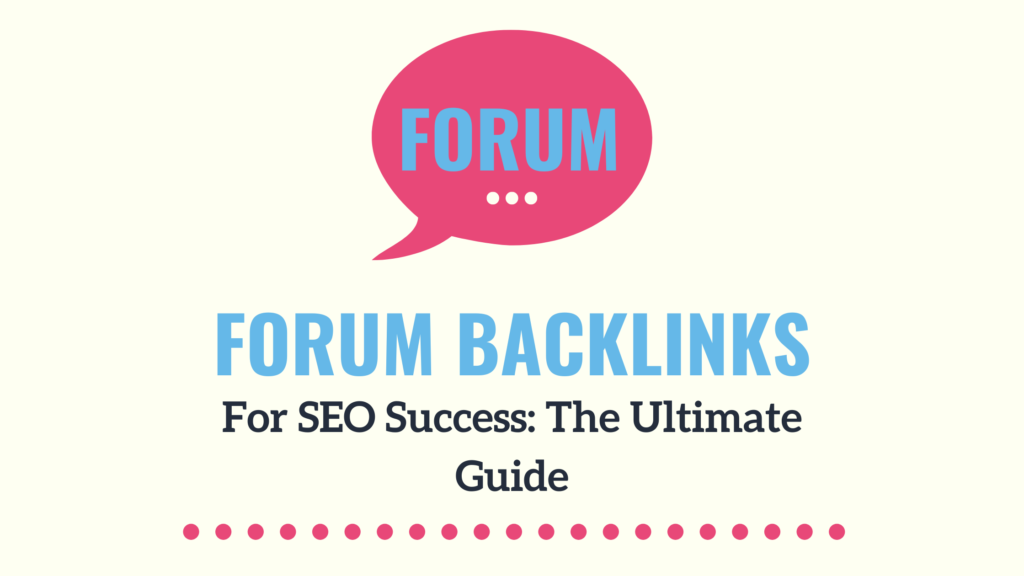
We always build links to increase our website’s visibility in SERPs. The more popular our site is, the better its ranking will be. There are several methods to build links, and we tried most of them. But forum backlinks are one of the most effective ones.
If you’re looking for an effective way to improve your SEO, forum backlinks may be the answer. This ultimate guide will discuss what forum backlinks are, how to get them, and whether or not Google values them.
We’ll also cover the different types of forum communities and how to find the best ones for your business. So whether you’re just starting in SEO or looking for ways to take your link-building strategy to the next level, forum backlinks are a valuable resource to pay attention to!
What Is A Forum?

A forum is an online platform where individuals can post discussions and engage in conversations on various topics, including how forum backlinks work. It typically consists of multiple threads or topics, each started by a user with a specific question or discussion point.
Other users can then reply to these threads, contributing their insights or opinions. Forums are organized into categories, allowing users to find discussions relevant to their interests easily. Moderators often oversee the content to ensure rules are followed, and discussions remain respectful.
Forums can be public, allowing anyone to join and post, or private, requiring membership approval. They are valuable for sharing information, seeking advice, building communities around common interests, and creating opportunities to enhance online visibility and SEO through forum backlinks.
Types Of Forums
Forums are online discussion sites where people can hold conversations in posted messages. They can be categorized based on their primary focus and structure. Here are five main types of forums:
Discussion Forums
- General Discussion Forums: These are broad forums where users can discuss a wide range of topics that are not limited to a specific subject. Examples include Reddit and 4chan.
- Specialized Discussion Forums: These forums are focused on specific interests or topics, such as technology, gaming, or hobbies. Examples include Stack Overflow for programming and AVS Forum for audio-visual enthusiasts.
Q&A Forums
- Expert Q&A Forums: Expert Q&A forums are platforms where users can ask questions and receive answers from experts or knowledgeable community members. Examples of such platforms include Quora and Stack Exchange.
- Peer-to-Peer Q&A Forums: These forums are geared towards user-generated questions and answers without focusing on expert validation. Examples include Yahoo! Answers and Reddit’s Ask Me Anything (AMA) threads.
Support Forums
- Customer Support Forums: Companies often create forums for users to get help with their products or services. Examples include Apple Support Communities and Microsoft Community.
- Peer Support Forums: These are often created around health issues, mental health, or addiction, where users can get support from others experiencing similar issues. Examples include forums on MedHelp and the SoberRecovery community.
Social Forums
- Interest-Based Social Forums: These are centered around social interaction among people with shared interests. Examples include photography forums like DPReview and music forums like TalkBass.
- Demographic-Based Social Forums: These forums are focused on specific demographic groups, such as age, gender, or location. Examples include Mumsnet for parents and BlackPlanet for African American users.
Professional And Academic Forums
- Professional Networking Forums: Platforms designed to network, share industry insights, and discuss career-related topics. Examples include LinkedIn Groups and Fishbowl.
- Academic and Research Forums: Forums where academics, researchers, and students discuss their fields, share research, and collaborate. Examples include ResearchGate and Physics Forums.
Each type of forum serves a unique purpose and caters to different audiences, fostering communities where members can share information, seek advice, and connect with others with similar interests or experiences.
What Are Forum Backlinks?
Forum backlinks are hyperlinks placed on online discussion boards, linking back to a specific website. Users typically embed these links within their posts, signatures, or profiles. They serve multiple purposes, including generating traffic, enhancing SEO, and improving domain authority.
Users can create backlinks that direct readers to their site by participating in relevant forums. Search engines like Google consider these backlinks when ranking websites, indicating the site’s relevance and popularity—however, the quality of the forum and the context of the link matter significantly.
Spammy or irrelevant forum backlinks can harm SEO efforts rather than help. Consulting a forum backlinks list can be invaluable for those looking to optimize their strategy. Effective forum backlinking involves engaging genuinely with the community and providing valuable contributions.
Are Forum Backlinks Good For SEO?

Yes! These backlinks are a valuable asset for any SEO strategy. They help improve your website’s visibility and ranking in SERPs and increase traffic and brand awareness.
They can lead to high-quality referral traffic that converts into customers or clients. And because forum users are often highly engaged, they’re more likely to share your content with their networks, further amplifying its reach.
Are Forum Backlinks Nofollow?
Many SEO experts believe these backlinks are one of the most valuable links you can get. Nofollow links don’t pass along “link juice” (i.e., they don’t help improve your website’s ranking). However, forum backlinks are typically dofollow, which can help your website rank higher in SERPs.
Well, only some forum links follow. It depends on the forum site’s policy. You need to check before posting a link on the forum.
How To Get Forum Backlinks?
They are the most accessible types of backlinks that can be generated. Here are five steps that you can try to build them.
Step One: Find forums In Your Industry.
The first step is finding forums relevant to your industry or niche. You can use Google to search for industry-specific forums, or you can browse through forum directories like Big Board List.
The easiest way to find forums is by using Google search strings such as:
- “your industry + forum,”
- “your niche + forum,” or
- “top forums for your industry.”
These are just three search strings; you can use any other string (and their variations), and they should uncover an excellent selection of potential forums with do-follow backlinks.
But if you want to dig even deeper, you can always create your combination of search operators within Google to customize your searches further.
Step Two: Check Whether The Forum Offers Do Follow Links.
The next step is to check if the forum offers dofollow links. There are a few ways to do this:
- Look for a forum’s link policy. Many forums will have a link policy specifying whether they offer dofollow links.
- Check the forum’s source code. Right-click a forum post and select “View Page Source.” Then, use CTRL+F (or CMD+F on a Mac) to search for the word “nofollow.” If you don’t see it anywhere, that’s a good sign that the forum offers dofollow links.
- Use a tool like MozBar. This free Chrome extension allows you to quickly check the link status of any website (including forums). Just install the extension and then click on the icon when you’re on a forum page. If it’s green, that means the forum offers dofollow links.
Step Three: Understand The Community Guidelines.
Before posting on a forum, it’s essential to read and understand the community guidelines. This will help you avoid getting your forum account banned and give you a better sense of what type of content is appropriate for the forum.
Some forums may have strict guidelines about self-promotion, so it’s essential to be familiar with the rules before posting links. Not all forums will have this restriction, but it’s still a good idea to get a sense of the forum’s culture before posting.
Only some forums may require you to have a certain number of posts before you can post links. So, if you’re looking to get forum backlinks quickly, it’s best to find forums that don’t require this. These are called “link-drop forums.”
Note
Link-drop forums: Link-drop forums allow users to post links in their signature or profile after a certain number of posts. These are usually high-quality forums with a lot of traffic, making them an excellent place to get these backlinks.
Step Four: Add Your Links.
Once you’ve found a forum that offers dofollow links and familiar with the community guidelines, you can start adding your links.
When adding a link, be sure to add relevant and insightful comments. This will help you avoid being perceived as spam and improve your chances of getting your forum backlink clicked.
Building relationships with other forum members by responding to their posts and offering helpful advice is also a good idea. Doing so will increase the likelihood that they’ll click on your forum backlink when they see it.
Step Five: Continue Your Forum Posting Strategy.
It would help if you were consistent with your forum posting to get the most out of these backlinks. This means regularly finding and posting on forums relevant to your industry or niche.
The more active you are on a forum, the more forum backlinks you’re likely to get. But it’s essential to balance being active enough to get forum backlinks rather than so active that you’re perceived as spam.
A good rule of thumb is to post on two to three daily forums. You can gradually build up many forum backlinks without being too aggressive.
FAQs
Q. How Many Forum Backlinks Should I Get?
Ans: There is no magic number of these backlinks to aim for. The important thing is to focus on quality over quantity. Having a few high-quality forum backlinks is better than many low-quality ones.
Q. How Do I Know If A Forum Is Relevant?
Ans: A forum is relevant if it’s in the same industry or niche as your website. For example, if you have a website about SEO, a forum about digital marketing would be relevant.
Q. What Are Some Popular Forums?
Ans: There are many popular forums across a wide range of industries and niches. A few examples include:
- Quora
- Warrior Forum
- Digital Point Forum
- BlackHatWorld Forum
Final Thoughts
Forum backlinks can be an excellent way to improve your website’s SEO. It’s essential to focus on quality over quantity and only post on relevant forums to ensure effectiveness. Following these tips can quickly and easily build a strong forum backlink profile that will help improve your website’s SEO.
And remember to check out our backlink-building services if you need help getting started with forum backlinks! Please comment in the comment section.
if you have questions or any other link-building method. We will happily answer all your questions and provide further guidance on creating valuable backlinks in forums.
We hope this article was helpful,
Thanks for reading 🙂


